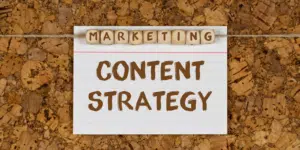Content Marketing in 2023: Strategies for Success

Welcome to 2023’s amazing content marketing! As we navigate the ever-changing digital landscape, content reigns. Businesses are using strategic storytelling to engage with their audience like never before in intriguing blog articles and eye-catching films.
The Importance of Content Marketing in Today’s Digital Landscape
Content marketing is essential for organizations to stand out in the digital age. It helps brands communicate their story and engage with their consumers. Businesses may become industry thought leaders by generating valuable and entertaining content. Content marketing is important since it drives organic traffic to your website. Search engines notice high-quality content that solves your audience’s problems and offers insights. This boosts organic traffic and SERP exposure. Content marketing also builds audience trust and trustworthiness. Your content can educate, inform, and entertain instead of selling. By providing value without asking anything in return, you become a niche authority.
Quality material promotes social sharing. People are more inclined to share your website or blog content on Facebook or Twitter if they think it is useful or interesting. This boosts brand awareness and attracts new customers.
Current Trends in Content Marketing
Content marketing is always changing, so staying current is essential. Today’s digital landscape is full of information, so it’s important to create new ways to engage consumers.
Interactive content is a content marketing trend. No more static blog postings and articles. Instead, businesses use quizzes, polls, calculators, and other interactive features to personalize their audience experience. This boosts engagement and lets brands collect customer data.
User-generated material is also growing. Friend and peer recommendations are more trusted than ads. You may build trust and social proof by encouraging customers to develop and share brand-related content.
Many successful content methods use influencer marketing. Working with specialized influencers with loyal followings can increase your reach and reputation.
Additionally, video remains the most popular content medium. Brands are taking advantage of YouTube’s popularity by making captivating videos that tell stories or teach.
Leveraging Social Media Platforms for Content Distribution
Social media has transformed our communication. It also changed how companies reach customers. Brands may boost online visibility, customer engagement, and website traffic by distributing content on social media.
Wide reach is a major benefit of social media content dissemination. Facebook, Instagram, Twitter, and LinkedIn have billions of active users, helping marketers reach more people. Businesses can get followers and consumers by posting relevant information on these networks.
Two-way communication is another benefit of social media content delivery. Social media lets brands talk to their customers, unlike traditional marketing mediums. This allows firms to foster client relationships by responding quickly to comments and messages.
Staying current on trends and algorithms is crucial for content distribution on social media in 2023 and beyond. Each platform has different organic reach and engagement rules. Knowing how these algorithms work can help you maximize post-exposure.
Video and Visual Content: The Future of Marketing
It’s easy to see why marketing is embracing video and graphic material. In today’s fast-paced digital world, information is everywhere. Thus, catching their attention and leaving a lasting impression is harder than ever.
Brands are using video and visuals in their content marketing to stand out. Videos may interest viewers with appealing graphics, compelling storytelling, and emotional connections. They help brands simplify difficult messaging.
Videos are easily shared on social media, expanding their reach dramatically. Videos can go viral and generate buzz for organizations, whether they’re product demos or brand stories.
Not only are videos promising for marketing; but visual material in general is growing. Modern civilization is visually driven; thus photos, infographics, and memes are great ways to grab attention.
VR and AR give marketers greater tools to develop engaging consumer experiences. These innovative technologies let brands present products and services in new ways.
Personalization and Targeting in Content Creation
Personalization and targeting are essential in content production as brands seek deeper audience engagement. Today’s digital consumers want personalized experiences. No more generic, unengaging stuff.
Marketers may now develop targeted content that resonates with their target audience thanks to technology and analytics. Brands can tailor messages to user behavior, demographics, and preferences to increase engagement.
Personalization is used with dynamic content. This involves dynamically modifying web pages or email elements based on user behavior. E-commerce sites may recommend products based on browsing or purchase history. Brands may turn leads into loyal consumers by making relevant recommendations.
Effective content development also requires targeting. Brands must identify and tailor messaging to their audience. Understanding client pain points lets organizations address issues and position themselves as solution providers.
Social media networks capture massive amounts of user data for customization and marketing. Marketers can use this data to create targeted advertising or sponsored posts that blend into consumers’ feeds.
Brands must use data ethically. Consumers like customization but may feel uneasy if corporations breach limits or compromise their privacy.
Building an Effective Content Strategy for 2023
Businesses need a strong content strategy to stand out and engage with their audience in the digital age. A clear plan is even more crucial as we approach 2023. How do you create a successful content strategy?
Understanding your audience’s wants is crucial. Learn about your ideal customer through market research. This helps you personalize information to their deeper needs.
Next, write high-quality, useful material that answers industry or specialty issues. Whatever provides value—blog entries, films, podcasts, or infographics—is fine.
Add user-generated content (UGC) to your plan. UGC builds trust and inspires new ideas from customers and followers.
Furthermore, a narrative can grab attention and create emotional bonds with your audience. Create authentic, relatable storylines that reflect your brand values.
Keep publishing frequency consistent across blogs, social media, email newsletters, etc. Consistency creates audience anticipation and brand credibility.
Measuring Success in Content Marketing: Metrics to Track
Content marketing success must be measured to see what works and what needs improvement. Tracking important metrics can reveal how your content is engaging and achieving goals. Check your content strategy’s effectiveness with these KPIs.
- Website Traffic: Content marketing aims to increase website traffic. Monitoring website traffic and page views can show how successfully your content attracts people.
- Engagement Metrics: It’s not enough to get visitors—you also need to keep them interested. Check the bounce rate, average time on the page, and social shares to see how engaging your content is.
- Conversion Rates: Your audience should act on your material. Check lead-generating forms and sales sites for specialized content to see if it’s converting readers into buyers.
- The growing relevance of social media in content distribution makes metrics like followers, likes, comments, and shares useful for measuring the reach and impact of your social media initiatives.
- SEO Performance: Content matters. Monitor keyword rankings, organic search traffic growth, and backlinks from quality sites from guest posting or link-building initiatives powered by exceptional content.
Remember to examine these data over time, not just for one article or campaign!
Case Studies: Successful Brands and Their Content Marketing Strategies
Check out some successful content marketing brands. Innovative strategies and insights from these case studies might inspire marketers.
Red Bull, recognized for its energy drinks and entertaining content, stands out. They perfect the narrative by making adrenaline-pumping videos of extreme sports around the world. They’ve built a dedicated following that shares and engages with their material by aligning it with their target audience’s interests.
Airbnb has transformed travel with content marketing. They promote unusual lodgings and experiences worldwide using user-generated material. Airbnb has established an authentic community-driven platform that appeals to travelers seeking personalized experiences by encouraging users to submit their tales and images.
Nike continuously creates compelling content. Nike uses emotional imagery and compelling stories to inspire athletes of all levels. Sportspeople worldwide look to their campaigns for inspiration because they tell relatable stories of perseverance and achievement.
These successful companies show how emotional connections and valuable content can engage audiences. Understanding your target market’s needs and pain areas lets you build strategies that resonate.
Tools and Resources for Streamlining Your
As we plan for 2023 content marketing, we need the necessary tools and resources to streamline our efforts. In this competitive digital age, organization and efficiency are essential.
- CMS: Use WordPress, Joomla, or Drupal to easily create, publish, and edit content. These platforms make search engine optimization easy with their interfaces.
- Keyword Research Tools: Use SEMrush or Google Keyword Planner to develop engaging content for your target audience. These tools help you find keywords that can enhance your organic search rankings and site traffic.
- Social media scheduling tools: Managing numerous channels takes time. Use scheduling tools like Hootsuite or Buffer to simplify. They save you time and help you maintain a consistent online presence by planning and scheduling social media postings.
- Analytics Platforms: Tracking content performance helps you find what works for your audience. Google Analytics lets you use page views and bounce rates to improve your content strategy.
- Content Creation Tools: Spice up your blog posts and social media updates with Canva or Adobe Spark Post. These simple platforms allow non-designers to generate compelling visuals with pre-made templates and drag-and-drop functionalities.
- Email marketing software: Email is still one of the best ways to reach clients directly. Use Mailchimp or Sendinblue to simplify email campaigns. They give configurable templates, user segmentation, and statistics to track campaign success.
- Project Management Tools: Content marketers often manage many projects. Trello and Asana help you stay organized and meet deadlines. These tools let you organize tasks, assign team members, and track progress.
- Collaboration Platforms: Writing and editing with others? Use Google Docs or Dropbox Paper to simplify content creation. Real-time editing and commentary simplify project collaboration on these platforms.
- Grammarly or Hemingway Editor can help you avoid typos and grammatical problems in your text. These technologies improve writing readability and quality.
- If you’re stuck for content ideas, try HubSpot’s Blog Topic Generator or Portent’s Content Idea Generator. Enter specialty keywords to get blog article ideas from these tools.
These tools and resources can help you save time, stay organized, and develop high-quality, audience-targeted content for success in the ever-changing world of content marketing.



 Bill Yeager, Co-Owner of High Point SEO & Marketing in CT
Bill Yeager, Co-Owner of High Point SEO & Marketing in CT